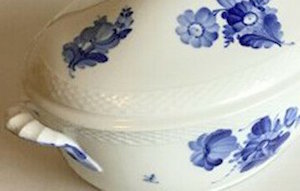
|
|
|
|
|
| Issue 7: | March 2021 |
| Ekphrastic CNF: | 291 words |
By Roberta Beary
Blue Flower Braided
after An Orchid (1941) by Georgia O’Keeffe
Toward the summer isle
Where bamboos spire to shafted grove
And wide-mouthed orchids smile
—Claude McKay *
Long after my mother’s death, her white orchid still thrives. Perhaps its bamboo stalks provide something more than decoration. Were they the healing supplement I had missed that day in the pharmacy as I searched the shelves for an elixir that would save her?
I remember sweeping dozens of pill bottles into a cardboard box and carting them to the precinct that accepts such things, and then destroys them. The desk sergeant seemed unconcerned. He didn’t want to hear about my attempts to prop up what couldn’t or wouldn’t sit up in bed. He wasn’t interested in the first broken hip, the second, or the years that separated them. He couldn’t care less about the rare day my mother remembered my name. And that one time in three years we had a real conversation. About the pattern for my wedding china. How I gave in to my then-husband’s choice: Royal Copenhagen Blue Flower Braided. The first compromise of many. Something I had forgotten for 30 years. And didn’t wish to remember.
I put down the dustpan and approach the round green pot. The white petals look exactly as they did when Mother’s lips kissed them goodbye. Perhaps she left a message. Buried deep within the petals. Waiting all these years for me to notice. I pin back my hair, bend my head, and gently place my ear against the orchid’s wide mouth. A voice rings out.
“You never should have given into him, not on the china, not on anything. But you did. And look where it’s gotten you. Look at yourself. Just look.”
* Publisher’s Notes:
Epigraph is from Claude McKay’s poem
After the Winter, first published in his book Harlem
Shadows (Harcourt, Brace & Company, 1922).
An Orchid (1941; pastel on paper mounted on board) by Georgia O’Keeffe
may be viewed online at: Museum of Modern Art.
Blue Flower was a signature pattern of hand-painted porcelain created in 1779
by Royal Copenhagen; after hand-producing a range of products with the pattern for 200
years, the company discontinued it. “Braided” refers to the textured design
on certain items, such as the rim of the soup tureen shown in the example below. (Other
designs include fluted and angular; more details available at
RC: Patterns.)

(Posted to eBay by Danam Antik)
Roberta Beary’s
second collection of short poems, Carousel, is co-winner of the Snapshot Press 2019 book award contest. Her first short-form collection, The Unworn Necklace, received a finalist book award from the Poetry Society of America. Her collection of prose poetry, Deflection (Accents Publishing, 2015), was named a National Poetry Month Best Pick by Washington Independent Review of Books.
Long-time haibun editor of Modern Haiku, Ms. Beary is also co-editor of Wishbone Moon: An Anthology of Haiku by Women (Jacar Press, 2018), and she recently judged the Sable Books Haiku Contest for Women Book Award.
Her writing has appeared in Rattle, KYSO Flash, 100 Word Story, Cultural Weekly, Beltway Poetry Quarterly, and The New York Times, and is also featured in A Companion to Poetic Genre (John Wiley & Sons, 2011) and Haiku In English: The First Hundred Years (W. W. Norton, 2013).
Ms. Beary lives in the west of Ireland with her husband, Frank Stella, and tweets her photoku and micro-poetry on Twitter [at] shortpoemz.
Author’s website: https://robertabeary.com/news/
More on the Web: By, About, and Beyond
⚡ Roberta Beary, haiku poet and editor, on writing Haibun, interview on YouTube (8 February 2021) with Mike Rehling, editor of Failed Haiku
⚡ Tiny Love Stories in The New York Times (8 January 2019); scroll five stories down the page for Roberta Beary’s “Now It’s All Fresh Fish” and her photograph of lobster traps in Clew Bay, Ireland.
⚡ The art of brevity, an interview by Ciara Moynihan in Mayo News (22 January 2019)
⚡ Lunch Break, a haibun by Beary in Rattle (#56, Summer 2017), Tribute to Poets with Mental Illness; includes audio (17 July 2017)
| Copyright © 2019-2026 by MacQueen’s Quinterly and by those whose works appear here. | |
| Logo and website designed and built by Clare MacQueen; copyrighted © 2019-2026. | |
|
Data collection, storage, assimilation, or interpretation of this publication, in whole or in part, for the purpose of AI training are expressly forbidden, no exceptions. |
At MacQ, we take your privacy seriously. We do not collect, sell, rent, or exchange your name and email address, or any other information about you, to third parties for marketing purposes. When you contact us, we will use your name and email address only in order to respond to your questions, comments, etc.